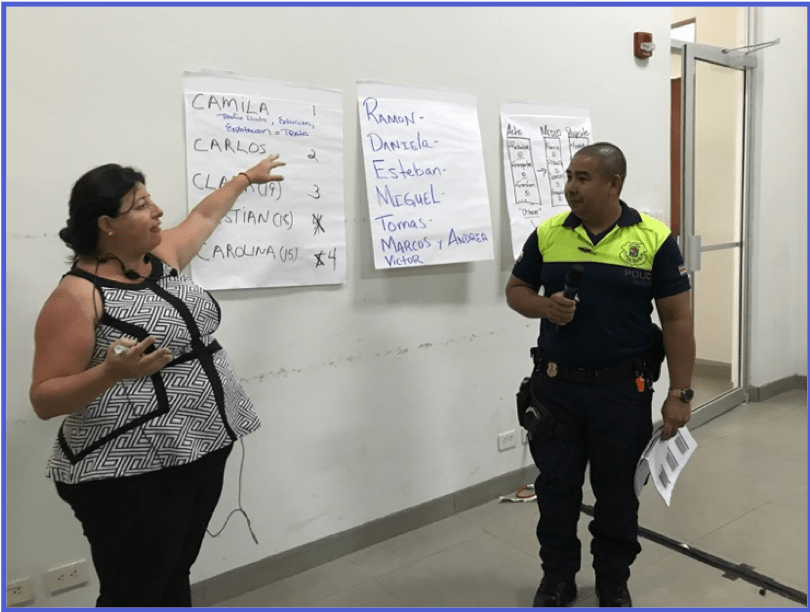Warnath Group’s Ana Isabel Vallejo works with a Santa Cruz police officer during an interactive exercise.
After an initial training in Costa Rica in 2013 conducted by Warnath Group experts Florrie Burke, Albert Moskowitz and Stephen Warnath, a Warnath Group Team composed of Albert Moskowitz, Ana Isabel Vallejo, and Amy Rofman, returned to Costa Rica for a series of four trainings between October 21 and November 1, 2019. Each training took place over the course of two days and were held in San José, Los Chiles, Santa Cruz, and Garabito. For these trainings, the Warnath Group experts collaborated with local prosecutors and investigative police, as well as members of CONATT, the National Coalition Against Trafficking in Persons and Illegal Smuggling of Migrants. Each training focused on developing skills the front-line responders in attendance would be able to use in the fight against trafficking including identification and referral.
Each training began with a review of the relevant domestic law and international law, including the Palermo Protocol. A Costa Rican prosecutor led the discussion of the country’s law in each location, ensuring that participants had a strong understanding of the details of Costa Rican anti-trafficking law and prosecution. The Warnath Group experts stressed the importance of understanding the difference between smuggling and trafficking, which are often conflated. They also highlighted the differences between adult and child trafficking, primarily that the “means” element which must ordinarily be present for trafficking of adults to occur is not a consideration in cases of child trafficking.
Throughout the workshops, Warnath Group experts worked to clarify the role of front-line officers in combatting human trafficking. In doing so, they highlighted the importance of taking a victim-centered approach to responding to potential instances of trafficking and referring potential cases using the national referral mechanism. Local prosecutors and investigative police were able to highlight the resources available to front-line responders when they encounter instance of trafficking, such as PANI, the Costa Rican child protection agency. They also shared insights into how prosecutions are handled and helped participants understand the elements of effective prosecution and building stronger human trafficking cases. CONATT representatives also participated in several of the trainings to provide detailed information about the national referral mechanism.
In addition to informational lectures, participants were given the opportunity to apply their skills in a series of interactive workshops. These interactive exercises also gave participants the opportunity to share their own experiences in working with victims of trafficking. The participants discussed the instances of trafficking they had experience and apply the tools provided by the Warnath Group to these situations. The first-hand experience of the participants shaped much of the discussion during exercises and participants benefitted from the ability to discuss how to improve their interactions with victims of trafficking with skills and understanding covered during the training sessions.
One of the added benefits of the training were the opportunities between police, prosecutors, social workers, and other participants to establish closer working relationships. Many participants shared contact information with each other, and Mr. Moskowitz and Ms. Vallejo both expressed that they hoped these connections would be used in the future during the investigation and prosecution of human trafficking cases in Costa Rica and working appropriately with victims.
The positive feedback from the participants indicated that the trainings provided new knowledge and skills that they could apply to their work on human trafficking cases in the future. A police officer from Santa Cruz shared, “What I found most useful was the victim indicators since it shows us different verbal and physical signs that can be shown by a trafficking victim and helps us to identify the problem.” Since the trainings, Warnath Group has continued communication with the participants and continues to foster collaborative relationships.
These workshops were made possible by the U.S. Department of State’s Office to Monitor and Combat Trafficking in Persons (J/TIP) with the assistance of the U.S. Embassy in San José and the Costa Rican National Coalition Against Trafficking in Persons and Illegal Smuggling of Migrants (CONATT).

Warnath Group’s Albert Mosowitz leads a discussion with Costa Rican training participants in Los Chiles.

The local prosecutor presents on the Costa Rican TIP law at the Santa Cruz traning.

